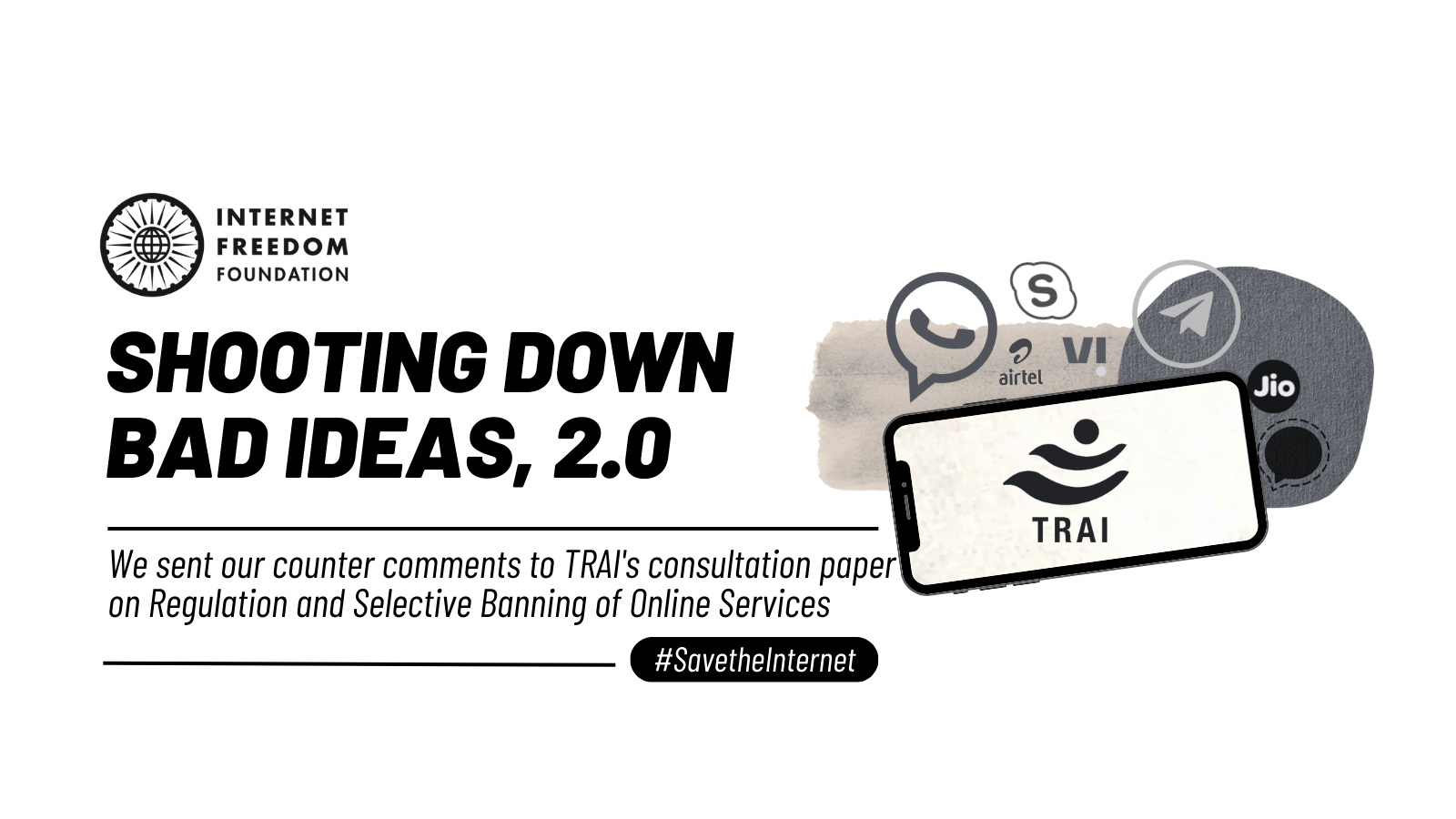
tl;dr
On July 7, TRAI released a consultation paper which dealt with the idea of regulating, licensing, and selectively banning online communication services (“OCS”). As part of this consultation, we sent our comments to TRAI, voicing our vehement opposition to such an idea. Some comments received by TRAI on the paper, particularly those sent by telecom companies (“telcos”) such as Reliance Jio, Airtel, Vodafone Idea, and BSNL, raised alarms. We thus felt compelled to send our counter comments, further strengthening our initial arguments and countering the arguments raised by telcos.
Why should you care?
Bringing OCS under a licensing regime and/or requiring them to pay network usage fees will affect the very architecture of the free, open, and neutral internet. It won’t just increase compliance and cost burdens for internet applications and services, but may also increase costs for users. Obligations on OCS to intercept messages, locally store data, break end-to-end encryption (“E2EE”), verify customer or communicator identity will diminish the right to privacy and may even strip away a user's choice to stay anonymous on the internet. These are just some ways how this idea of regulating and licensing OCS will affect you directly, as a user on the internet.
Time to Save The Internet, again.
In a crisis situation where our internet is under danger, there is a looming need to engage in this consultation process and protect the fundamental concept of net neutrality. To enable smoother, wider, and more impactful participation from internet users, we built an automatic mailer that allows a concerned user to send a templatised response to TRAI in a matter of minutes. The steps to do so are as follows:
Upon landing on the webpage savetheinternet.in, a user will be required to submit a few details which will result in a pre-filled email box {including the body of the email (counter-comments), recipients (to: Advisor, TRAI; cc: IFF), and subject line} appearing on user’s device. Once that email box appears, all is left to do is hit send.
If the mailer doesn’t work for someone, relevant details for sending the email, including the draft text for counter-comments are added here.
More than 1800 concerned internet users have chosen to take out two minutes to save the internet, and you can do so too by following the above mentioned easy, yet impactful steps.
Detailed submission
Net Neutrality
TSPs are demanding a “slice of the pie” from online service providers, arguing that their hefty capital investments in building telecom infrastructure have helped generate traffic for these service providers. Their justification is that since these services generate substantial traffic, they should contribute to infrastructural costs. Interestingly, the telcos and other stakeholders representing them also feel that the online services should pay the Government and contribute to the network development efforts undertaken by the latter. However, here's the kicker - the TSPs haven't defined what exactly qualifies as a "large traffic generator" or suggested a clear fee structure; leaving it to be decided under the regulatory framework. Even more disappointingly, most TSPs denied claims that such a model of revenue sharing would stomp on net neutrality principles or hike up costs for users.
The concern of telcos facing high levies and charges due to overregulation is one that cannot be denied, however levying similar charges on internet services will not reduce the monetary burden of telcos. It is also unfair to assume, without evidence, that internet services must be obligated to pay for developing infrastructure. We reiterated that imposing financial burdens on OTTs isn't the way to go. Instead of dancing to the tune of telcos and online service providers, TRAI should be focused on safeguarding the rights and interests of users. We highlighted how such a move could mean increased subscription fees or in-app purchases or even push smaller players out of the game, stifling innovation and creating unnecessary entry barriers.
In 2016, TRAI released a watershed regulation on Differential Pricing for Data Services, making sure TSPs couldn't favor some websites or entities over others based on financial deals, thus preserving net neutrality. The current fair share argument is an old trick in new packaging to levy network fees and break net neutrality. We hope TRAI upholds and strengthens the spirit of the Regulation.
Licensing
Demands by TSPs to regulate and license OCS have been justified by arguing that similar rules must be applied for offering similar services (for eg. voice calling or messaging) by different service providers. They are pushing for a “same service, same rules” argument to ensure a level playing field and accountability of OCS to balance national security, consumer interest, and privacy needs.
We reiterated our opposition against using the reductive term “OTT”, which is an over-simplified term, and also voiced that any classification of such services (by type of service offered, mode of offering service, number of subscribers, etc.) based on the telcos understanding of “OTT services” will be unable to reflect the complexities of services performing multiple functions.
Worryingly, the extension of regulatory guidelines to OTT services may impose obligations to intercept messages, directly verify customers, comply with data localisation and processing norms, among many others. It is worth noting that these obligations may have consequences in the form of weakening end-to-end-encryption, interception of messages, ability to remain anonymous, increased compliance burden, and so on. This becomes even more concerning given that India’s recently enacted data protection law does not put into place any meaningful safeguards against overbroad surveillance. We thus urge TRAI to interrogate the premise put forth by TSPs that, “OTTs” are direct technical/ functional substitutes of TSPs. We also cautioned TRAI against recommendations made by TSPs which runs on an instinct regulating the internet per se from the lens of TSPs rather than to satisfy any regulatory need.
Selective Banning
While the TSPs largely pointed out the technical challenges in selectively banning OTT services, they disappointingly failed to oppose the idea as a whole. Instead, the TSPs asked for support from OTT service providers / websites, particularly in sharing a full range of URLs and IPs with the former. Some TSPs even went so far as to suggest that all classes of OTT services, whether communication, content, or otherwise, must be brought under the regulatory framework for selective banning of OTT services in the country, in the interest of national security. Citing infrastructural and investment inadequacies on their end, the TSPs suggested that selective banning of apps should be implemented at the application level/ OTT service provider end, instead of the network layer.
It is worth noting that given restrictions in India tend to be localised, the application layer is also imperfect. IP Geolocation services like Maxmind estimate only a 66% accuracy at the city level in the US. The accuracy level may be lower in India, and may even be further complicated by the narrow/localised restrictions in India which are enforced at the level of cities, districts, or specific localities, and do not correspond to networks that geolocation services are based on.
Moreover, the method of implementation (limited according to duration or geographical area), process, and feasibility of implementation at scale of such bans remains unclear. Any such bans may lead to increased burden, cost, and worrying consequences for small-scale businesses and users. Such overbroad restrictions would be disproportionate and its implementation would be challenging, requiring burdensome, unimplementable orders.
Important documents:


